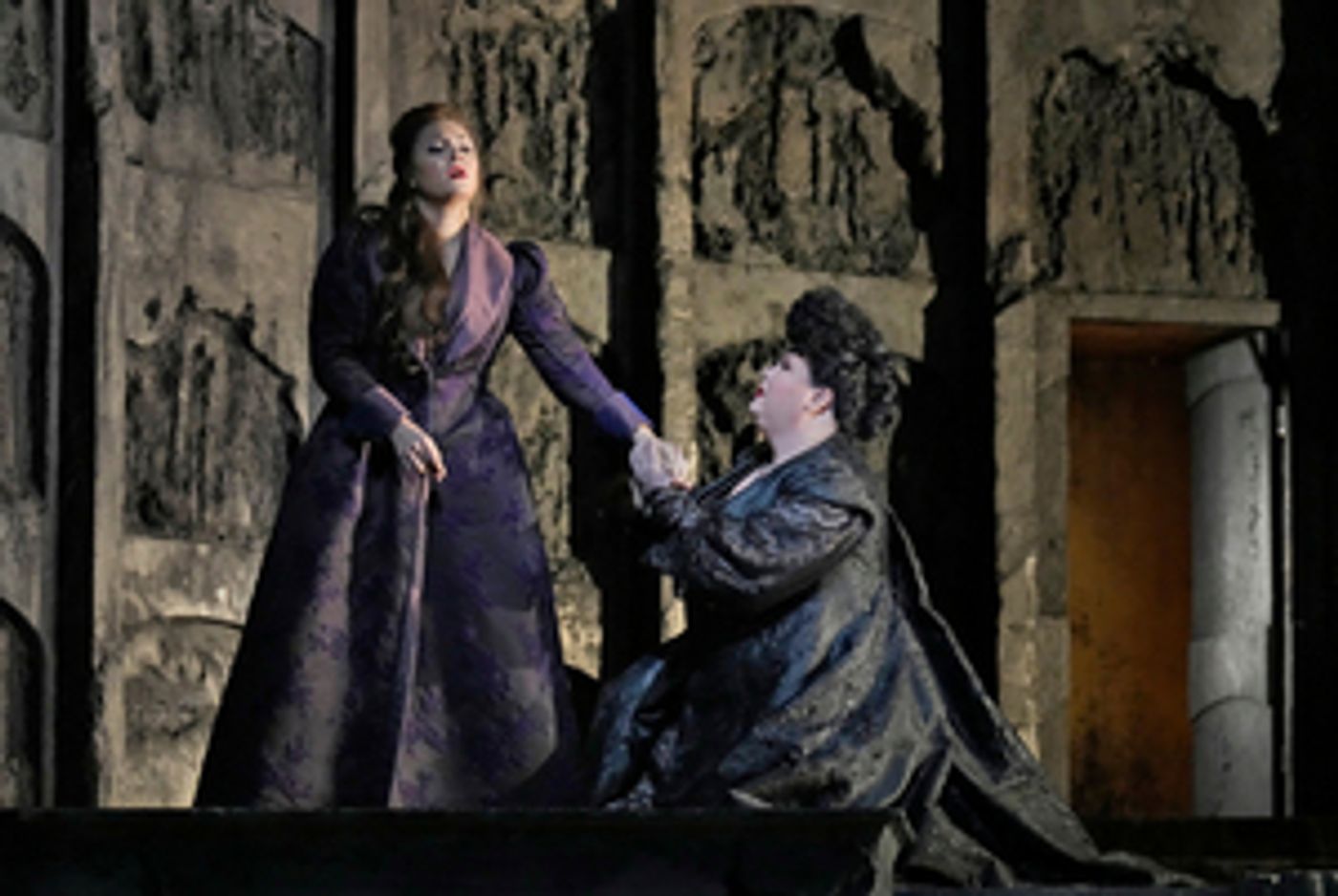Review: Now in the Original French, Met's New Production of Verdi's DON CARLOS Shows Off Impressive Cast
McVicar’s production is grim but doesn’t stop Yoncheva, Polenzani, Dupuis and Barton

Photo: Ken Howard/The Met
DON CARLOS--Verdi's original French language version, for the first time at the Met, of the opera better known in these parts as the Italian DON CARLO--was as grim as its setting in the Spanish inquisition in the new David McVicar production introduced last night. And about as long (though for once it ended earlier than expected)--Verdi's longest opera.
The colorless set (mostly charcoal) and costumes (mostly black) were a fitting tribute to the plight of the Ukrainian people as they fight against the Russians, even though they were planned long before the current world crisis. The evening started with the Ukrainian national anthem and there was a statement from the Met that it was cutting ties with artists supporting the heinous Vladimir Putin. It was a touching, yet harrowing, moment.
But what about those of us watching the opera? For us, the best of the evening was singing, singing, singing. (And of course, that great Met orchestra under the marvelous Yannick Nezet-Seguin.) And with a cast headed by Sonya Yoncheva (Elizabeth), Matthew Polenzani (Carlos), Etienne Dupuis (Rodrigue) and Jamie Barton (Eboli), there was little to complain about, except when the production let them down.

Photo: Ken Howard/The Met
Yes, it's more than a little different experience en francais than hearing it in Italian, more nuanced and with some changes in the relationships, though whether that's all music and not some directorial intervention is unclear. For instance, Carlos (Polenzani) and Rodrigue (Dupuis) seem on more intimate terms than usual in all their interactions.
About the only place I really missed the Italian was in Eboli's great aria "O don fatal" / "O don fatale," though Barton's fiery rendition made this the true definition of "quibbling." She was truly spectacular. Her earlier appearance in Act II's "Veil Song" ("Au palais des fées") would have been disappointing--hard to imagine that description for Barton, ever--in any language, because of the lackluster staging.
It's hard to imagine that the opera was ever staged without what is now Act I, sometimes referred to as the 'Fontainebleau scene', which fell outside the rest of the opera, where Carlos gets his first glimpse of Elizabeth. She was supposed to be his bride before being usurped by his father, Philippe (a disappointing Eric Owens) and they never get over it. This is where Yoncheva is first heard (while Polenzani was still warming up) and though she may not have the most luxurious voice, she made such a rich impression that she virtually became a centerpiece of the opera.

Photo: Ken Howard/The Met
I remember first hearing her in OTELLO and suggesting it be renamed DESDEMONA; I had similar feelings here. She had many opportunities to shine in the opera, but her Act V aria, "Toi qui sus le néant" (better known as the Italian, "Tu che le vanità"), was certainly a highlight for me.
The French Carlos is frequently more demure than his Italian counterpart and I think it robs Polenzani of some of his chance to make a greater impression, though his is clearly a strong presence in the action. He gave a supremely subtle performance, except when he seemed to run amok in his later scene with Elizabeth and, I think, could have used a little directorial assistance in finding his bearings.
The performer who nearly walked away with the evening was French baritone Dupuis as Rodrigue. He acted as if the role was built into him and he was so natural and clean that he made everyone else seem mannered, which was certainly not the case. His great duet with Carlos in Act II, "Dieu, tu semas dans nos âmes" (the Italian "Dio, che nell'alma infondere") was exquisite and his Act IV pre-death scene, "C'est mon jour supreme," just gorgeous.
Owens, as mentioned, was disappointing, particularly for his unforgivable, nondescript monologue in Act IV. It's not just voice that the aria calls for but drama. There was none of that in his performance. Bass Matthew Rose, as the monk who might have been Charles V, or even bass-baritone John Relyea (the Grand Inquisitor), might have done better in the role.
The sets were by Charles Edwards, with Adam Silverman's lighting, and Brigitte Reiffenstuel's costumes.
Performances of DON CARLOS will continue through the matinee on March 26, which will be broadcast live in the Met in HD series. For more information, see the Met's website.
Reader Reviews
Videos

